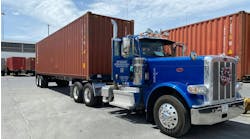If you thought you'd heard the last word on cell-phone use here, think again. It's a topic that just keeps people talking.
But seriously, a new study released last month by the National Safety Council (NSC) warrants serious consideration by anyone concerned about either ring-a-dingy motorists causing accidents or how bans on using cell phones in moving vehicles could affect their drivers' productivity.
The study strongly suggests that merely talking on a phone — be it a hand-held or a hands-free model — while at the wheel can slow driver response time and be more distracting than such other onboard activities as listening to the radio or an audio book.
According to the four researchers at the University of Utah who authored it, the study indicates that legislative efforts to restrict hand-held phones but permit hands-free units are “not likely to significantly reduce driver distractions associated with cell-phone conversations.”
And, in my humble opinion, the operative word is “conversing.” I have never thought the way truckers use cell phones to be distracting to them.
Generally, truck drivers don't converse. When they use the phone while driving it's to quickly convey critical information, such as in a check call to a dispatcher or to get better directions from a consignee. Besides, let's face it, professional drivers have been jawing on CBs for years without ill effect — except perhaps on those who don't cotton to colorful language.
The key difference, of course, is that truckers are professionals. Be it by phone or radio, they know when to talk, how long to talk, and when to just hang up and drive.
The real issue is the four-wheeler and his or her phone. Simply put, too much has been made of hands-free phone gizmos — meaning two hands are available to put on the wheel. Three hands aren't enough if the operator's focus isn't on the car he or she is allegedly driving. I've said it before but it bears repeating here: most “motorists” don't drive — they just take the car.
Or, as NSC president Alan McMillan puts it, the study “underscores the importance of reiterating that a driver's primary obligation is to operate his or her motor vehicle safely.
“A great deal more research like this is needed,” he goes on to say, “to help us fully understand the public policy implications of the growing use of cell phones and other electronic devices, such as global positioning systems, faxes and computers, in moving vehicles.”
The study involved 64 participants — whom we assume were “civilians” as they were only described as 32 male and 32 female undergrads — placed in controlled simulated driving conditions.
The subjects were randomly assigned to listen to and change radio stations, listen to audio books, engage in conversations while holding cell phones, and engage in conversations using hands-free cell phones.
What made it interesting is that they were also presented with a series of driving tasks, including such fun stuff as braking for red lights, and had their responsiveness and reaction time to these measured.
Here is what the study found: “The subjects involved in phone conversations showed significantly slower responses to traffic signals and missed signals entirely much more often than subjects who were listening to the radio or a book on tape.”
But there's more. And it's the clincher: “There was no measurable difference, however, in driver responses among those subjects using hand-held phones and those using hands-free devices.”
To learn more about the study, go to www.nationalsafetycouncil.org.


